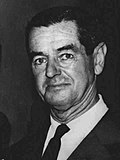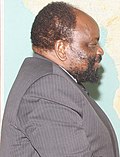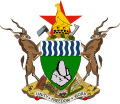| No. | Portrait | Name
(Birth–Death) | Term of office | Title |
|---|
| Federation of Rhodesia and Nyasaland (1953–1963) |
|---|
| 1 |  | Sir Godfrey Huggins
(1883–1971) | 7 September 1953 – 18 December 1953 | Minister of External Affairs and Defence |
|---|
| 18 December 1953 – 2 November 1956 | Minister of External Affairs |
| 2 |  | Sir Roy Welensky
(1907–1991) | 2 November 1956 – 31 December 1963 |
|---|
| Southern Rhodesia (1964–1965) |
|---|
| 1 |  | Winston Field
(1904–1969) | 1 January 1964 – 14 April 1964 [6] | Minister of External Affairs and Defence |
|---|
| 2 |  | Ian Smith
(1919–2007) | 14 April 1964 – 8 May 1964 [6] |
|---|
| 8 May 1964 – 28 August 1964 | Minister of External Affairs |
| 3 |  | Clifford Dupont
(1905–1978) | 28 August 1964 – 17 November 1965 [6] |
|---|
| Rhodesia (1965–1979, an unrecognised state) |
|---|
| — |  | Ian Smith
(1919–2007)
Acting | 17 November 1965 – 1966 | Minister of Foreign Affairs |
|---|
| 4 |  | The Duke of Montrose
(1907–1992) | 31 December 1966 – 11 September 1968 |
|---|
| 5 |  | Jack Howman
(1919–2000) | September 1968 – 31 July 1974 |
|---|
| 6 |  | P. K. van der Byl
(1923–1999) | 2 August 1974 – 1 June 1979 |
|---|
| Zimbabwe Rhodesia (1979, an unrecognised state) |
|---|
| 1 |  | David Mukome
(c. 1942–2020) | 1 June 1979 – 11 December 1979 | Minister of Foreign Affairs |
|---|
| Zimbabwe (since 1980, a recognised state) |
|---|
| 1 |  | Simon Muzenda
(1922–2003) | 18 April 1980 – 1 January 1981 | Minister of Foreign Affairs |
|---|
| 2 |  | Witness Mangwende
(1946–2005) | 1 January 1981 – 22 December 1987 |
|---|
| 3 |  | Nathan Shamuyarira
(1928–2014) | 22 December 1987 – 15 March 1995 |
|---|
| 4 |  | Stan Mudenge
(1941–2012) | 15 April 1995 – 14 April 2005 |
|---|
| 5 |  | Simbarashe Mumbengegwi
(born 1945) | 15 April 2005 – 9 October 2017 |
|---|
| 6 |  | Walter Mzembi
(born 1964) | 9 October 2017 – 27 November 2017 |
|---|
| — |  | Simbarashe Mumbengegwi
(born 1945)
Acting | 27 November 2017 – 30 November 2017 |
|---|
| 7 |  | Sibusiso Moyo
(1960–2021) | 30 November 2017 – 20 January 2021 | Minister of Foreign Affairs and International Trade |
|---|
| — |  | Amon Murwira
(born 1970)
Acting | 20 January 2021 – 2 March 2021 |
|---|
| 8 |  | Frederick Shava
(born 1949) | 2 March 2021 – 15 October 2024 |
|---|
| 8 |  | Amon Murwira
(born 1970) | 15 October 2024 – present |
|---|














